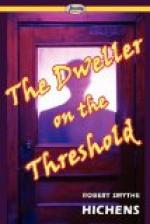“And you haven’t got nervous dyspepsia?”
“Should I be even a meliorist—as I am—if I had?”
“I must know Chichester. It’s a pity I didn’t know him formerly.”
“I don’t believe that matters,” said Malling, with intense conviction. “There is that in him which must strike you and affect you, whether you knew him as he was or not.”
“So long as I don’t turn tail and run from him, all’s well. I will tackle Chichester. In the interests of science I will face this curate. But how shall I approach him? As in golf, the approach is much, if not everything.”
He sat thinking for some minutes, with his eyebrows twitching. Then he said:
“The question is, Should the approach be casual or direct? Shall I describe a curve, or come to him as the crow comes when making for a given point—or is said to come, for I’ve never investigated that matter? What do you say?”
“It’s very difficult to say. On the day I dined in Hornton Street, Chichester certainly wanted to tell me something. He asked me to dine, I am almost sure, in order that he might tell it to me.”
“About the sittings with Harding, no doubt.”
“That, perhaps, and something more.”
“But he told you nothing.”
“Directly.”
“Do you think he would be more or less likely to unbosom himself now than he was then?”
“Less likely.”
“You might give me his address.”
Malling did so. The professor wrote the address down on a slip of paper, pinned the slip carefully to the yellow lining of his jacket, and then got up to go.
But Malling detained him.
“Professor,” he said, speaking with an unusual hesitation, “you know why I told you all this.”
“In the interests of science?”
“No, in the interest of that miserable man, Marcus Harding. I want you to break the link that binds him to Henry Chichester—if there is one. I want you to effect his release.”
“I’m afraid you’ve come to the wrong man,” returned Stepton, dryly. “My object in entering into this matter is merely to increase my knowledge, not to destroy my chance of increasing it.”
“But surely—”
“We shall never get forward if we move in the midst of a fog of pity and sentiment.”
Malling said no more; but as he watched the professor shambling to the garden gate, he felt as if he had betrayed Marcus Harding.
X
Soon after Malling had returned to London, he received the following note from Mr. Harding:
Onslow Gardens, June —th.
Dear Mr. Malling:
I seem to have some remembrance of your saying to me at Tankerton that you wished to speak to Professor Stepton with regard to a certain matter. I may be wrong in my recollection. If, however, I am right, I now beg you not to speak to the professor. I have, of course, the very highest regard for his discretion; nevertheless, one must not be selfish. One must not think only of one’s self. I have obligations to others, and I fear, when we were together at Tankerton, I forgot them. A word of assurance from you that Professor Stepton knows nothing of our conversation will set at rest the mind of




